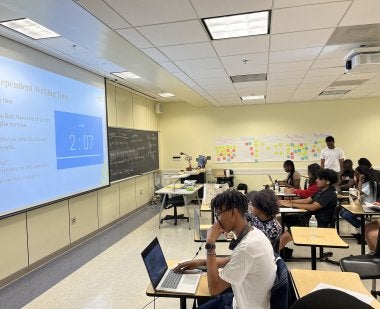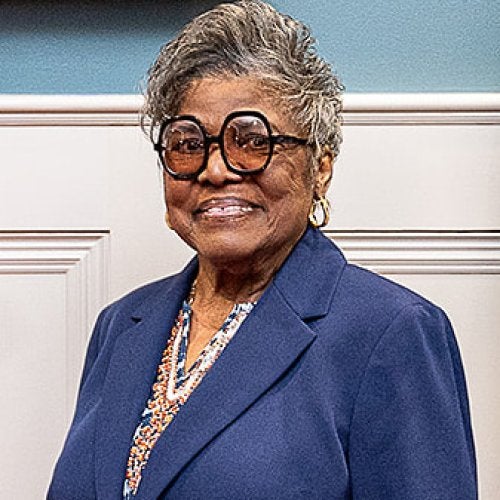
In an effort to address the education equity gap and support high school students of color, the University of Maryland College of Education launched a “Writing for College and Beyond” summer workshop series this year. Led by Olivia Williams, assistant director of the program and a postdoctoral research fellow, and Taylor Lewis and Gabriel Opare, doctoral students in the Applied Linguistics and Language Education (ALLE) program, the writing workshops are designed to help high school juniors and seniors enhance their writing skills as they prepare for the college admissions process.
For three weeks, 28 students from Prince George’s County Public Schools explored the components of effective college essays, brainstormed with each other and drafted essays that reflect their unique perspectives.
“We wanted to create a space where students could freely express how their backgrounds have shaped them,” said Laura Mahalingappa, associate professor of ALLE. “With the recent Supreme Court decision banning the consideration of race in admissions, students weren’t sure if they could talk about their experiences as it related to race. Our goal was to help them navigate this landscape confidently.”
The Supreme Court of the United States decision left many unanswered questions about the college admissions process for high school students, making initiatives like the writing workshops more important than ever. Without clear guidance, many students had concerns that mentioning race in their essays might affect their admissions decision. However, the writing workshops emphasize that discussing personal experiences, including those shaped by race, remains a significant part of their story.
“Prior to this week, I had a general idea on what to write but wasn't sure how I'd go about actually expressing it,” one participant wrote on a post-program survey. “ Now, I feel much more confident in writing about my experience.”
Another student wrote: “Going over the sample essays and identifying the problems present in each one was extremely helpful as I can make sure to avoid such mistakes in my essays.”
In addition to working on their college essays, students also engaged with representatives from the undergraduate admissions office who provided them with valuable insights and answered questions about the application process.
Access and equity in college admissions have come under the spotlight in recent years, as wealthy families leverage financial resources to create greater opportunities for their children. “Many families spend thousands on consultants to help with the application process, widening the equity gap in college admissions,” said Mahalingappa. “Our workshops offer a free alternative that ensures all students have access to expert guidance and support during this process.”
The workshop series is part of a research project funded by the University of Maryland Big Opportunity Fund. Mahalingappa, along with fellow PIs Nihat Polat, chair of the Department of Teaching and Learning, Leadership and Policy, and Shenika Hankerson, assistant professor of ALLE, hope that this initiative serves as a model for schools looking to implement similar programs for free or at a minimal cost.



